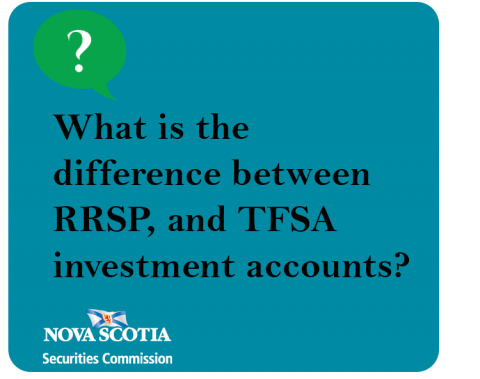Submitted by nsscadmin on

Tax season is coming which means for many investors it’s also RRSP season. Last year at this time we wrote a post on “Are RRSPs Securities.” This post went over the basics of RRSP accounts and how they worked. Now our readers are looking for the same information for TFSA investment account. To accomplish that let’s look at the similarities and differences between the two accounts.
RRSPs and TFSAs are trust accounts that hold investments. In an RRSP these investments are for your retirement, while a TFSA can hold investments for anything you would like to save for, including retirement. Both accounts can hold a wide range of investment including but not limited to cash, GICs, bonds, mutual funds, ETFs and equities.
The biggest differences regarding the two accounts center around taxes, contribution limits and age limits.
First let’s talk taxes. Contributions made to an RRSP account are tax deductible. This means you can deduct them off your income taxes. However, you must pay taxes on these contributions when you withdraw them. How much you pay is determined by your income when they are withdrawn. Contributions into a TFSA are not tax deductible and you do not pay any tax on withdrawals.
Now we’ll move on to contribution limits. The contribution limit for an RRSP in 2018 was 18 per cent of your earned income up to a maximum of $26,230. If you are part of a pension plan this limit is reduced.
The annual contribution limit for a TFSA in 2018 was $5,500. However, the contribution limit you do not use in a calendar year accumulates over time starting in 2008 as long as you were 18 years of age or older. Withdrawals from your TFSA can also affect your contribution limits.
Your age has a determining factor on your ability to contribute to an RRSP. When you turn 71 years old you are no longer eligible to contribute to an RRSP account. The last day you can contribute is December 31 of the year you turn 71. Once this deadline has passed an RRSP account must be converted to a RRIF or annuity and withdrawals are now allowed.
There is no age restriction for contributing to a TFSA, but you must be 18 years old to open one in most provinces, and 19 years old in Nova Scotia. There is no minimum age to open an RRSP account in many provinces, but due to the age of majority in Nova Scotia you must be 19 years old.
As you can see there are certain advantages and disadvantages to RRSP and TFSA accounts. To determine which are the best for you and your financial goals always assess these pros and cons and how they match up with your income, financial situation, expenses, future financial goals and even things like your age, dependents and health.
